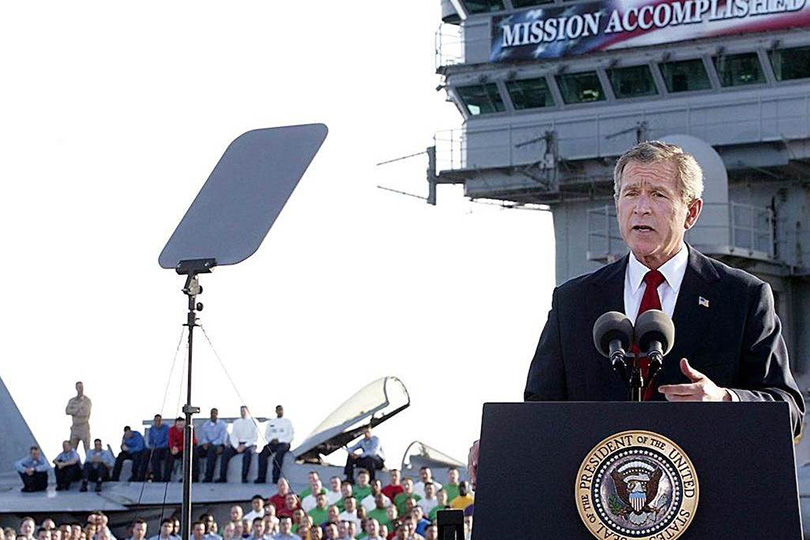Peter Singer
It is unlikely that former US President George W. Bush or any member of his administration will ever stand trial for initiating a war of aggression in Iraq. But it is still worth recounting the illegality of that act, not least because it is directly relevant to official US thinking on Iran and North Korea today.
Last month, the New York Times marked the 15th anniversary of the US-led war against Iraq with a poignant column by Sinan Antoon, an Iraqi novelist living in the United States, entitled “Fifteen Years Ago, America Destroyed My Country.” Antoon opposed both Saddam Hussein’s brutal dictatorship and the 2003 US-led invasion, which plunged the country into chaos, inflamed ethnic tensions, and killed hundreds of thousands of civilians. By destabilizing the region, the war enabled the rise of the Islamic State, which at its height occupied a substantial slice of Iraqi territory, beheading its opponents, attempting genocide against the Yazidi minority, and spreading terrorism around the world.
The war to overthrow Saddam was, beyond doubt, a tragic blunder. Antoon maintains that it was also a crime. If that is correct, its perpetrators are still at large. Few Americans will take seriously the assertion that President George W. Bush and other members of his administration – including Vice President Dick Cheney, Secretary of Defense Donald Rumsfeld, and John Bolton, recently appointed by President Donald Trump as his next National Security Adviser – are war criminals. Nor will many Britons think of Prime Minister Tony Blair in that light. Yet the case for saying that they committed a crime is surprisingly strong.
The idea that it is a crime to initiate a war of aggression goes back at least to 1919, when the Treaty of Versailles provided for Kaiser Wilhelm II to stand trial for “a supreme offense against international morality.” No such trial took place after World War I, but after World War II, initiating and waging wars of aggression was one of four charges on which, during the Nuremberg Trials, the International Military Tribunal convicted and sentenced to death 12 Nazi leaders, among them Reichsmarschall Hermann Göring, Foreign Minister Joachim von Ribbentrop, and Field Marshal Wilhelm Keitel.
After the trials, the International Law Commission of the United Nations codified the underlying legal principles in a document known as the Nuremberg Principles. The Principles state that anyone who commits a crime under international law is responsible for it and liable to be punished, regardless of the legality of their behavior according to the domestic law of the country in which they acted. The document sets out several crimes under international law, including “Planning, preparation, initiation, or waging of a war of aggression or a war in violation of international treaties, agreements, or assurances” and “Participation in a common plan or conspiracy” to initiate or wage such a war.
The US and the United Kingdom played leading roles in the Nuremberg Trials. If they fail to apply the same standards to their own leaders, is there not a whiff of hypocrisy?
The invasion of Iraq was an act of aggression against a country that was not attacking or threatening to attack another country. It was also a violation of the UN Charter, which includes the statement: “All Members shall refrain in their international relations from the threat or use of force against the territorial integrity or political independence of any state, or in any other manner inconsistent with the Purposes of the United Nations.” Bush and Blair sought Security Council authorization for the attack, claiming that Iraq was in violation of its agreement to disarm. But France, China, and other Security Council members refused, arguing that the weapons inspectors then in Iraq should be allowed to continue their work in order to establish whether Saddam possessed weapons of mass destruction. Nevertheless, Bush and Blair went ahead with the attack.
Bolton, at the time Under-Secretary of State for Arms Control and International Security, was part of the “common plan” to wage a war of aggression. He abused intelligence analysts who disagreed with the line the Bush administration wished them to support. John Prados, a fellow at George Washington University’s National Security Archives, has commented that: “Analysts working on Iraq intelligence could not be blamed for concluding that their own careers might be in jeopardy if they supplied answers other than what the Bush administration wanted to hear.” The Bush administration invoked false and misleading evidence, most notably forged documents purporting to show that Iraq had sought to buy uranium from Niger, to justify its predetermined decision to invade oil-rich Iraq.
Blair justified the invasion as necessary to stop Saddam’s crimes against humanity. In a recent memoir, Gareth Evans, a former Australian foreign minister and the principal author of the “Responsibility to Protect” doctrine that is now the basis of international thinking on when a war of humanitarian intervention is justifiable, has dismissed that claim. He acknowledges that Saddam committed atrocities in the 1980s and early 1990s that would have justified intervention, but by 2000 his behavior was “no more egregious than a score or more of other serial human-rights violators around the world.”
It is unlikely that Bush, or any member of his administration, will ever stand trial for the crime of initiating a war of aggression. The obvious venue for such a trial is the International Criminal Court. Although President Bill Clinton signed the treaty establishing the ICC, the Bush administration withdrew that signature, and the US is still not a party to the treaty.
That does not mean, however, that there is no point in discussing the putatively criminal nature of the attack on Iraq. International tensions have been rising since Trump took office. Bolton’s appointment will ratchet them up still further, given his ultra-hawkish views on Iran and North Korea. This is a time to remind ourselves that initiating a war of aggression is often a blunder, and always a crime, even if the crime goes unpunished.







Comments